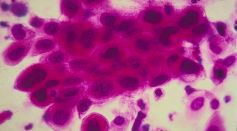Tags: Cancer

Researchers Predict Increase in Cancer Cases That Need Surgery
Medical Experts Explain That Immunotherapy Can Treat Some Types of Cancers
Designer DNA Targets Cancer Stem Cells and Malignant Plasma Cells in the Blood

Are You a Frequent Eater of Potato Chips? Here Are 5 of the Health Conditions You Should Watch Out For

What You Need To Know About HPV and Cervical Cancer
Cancer Cells Also Hibernate Like Bears to Survive Chemotherapy

Two Cancer-Stricken Children in Japan Got Their Tumor Cells Before Birth

Experts Can Now Diagnose Cancer Cells Without Invasive Biopsies
Breakthrough in Prostate Cancer: How an Aggressive Blocker Can Save Millions

New Experiment Confirms Relationship Between Obesity and Cancer
Processed Foods Linked To Heart Disease and Early Death

Human Evolution Could Be to Blame for Being Prone to Cancer, Study Says

Fatty Diets Feed Cancer and Starve Immune Cells

WHO Releases Global Data on Top Cause of Death Over Last 20 Years

Tears Can Now Be Used to Detect Devastating Disease For Immediate Treatment
PAHO/WHO Hosts the Global Strategy for the Elimination of Cervical Cancer

Chinese CDC Reports the Danger COVID-19 Postures for Patients with Lung Cancer
Beat Cancer Through Early Detection Using This New App
Common Weed From the Cabbage Family Can Stop Cancer
New Method of Immunotherapy Involves Training the Innate Immune System Against Cancer
Most Popular

Starship Spacecraft Explained: SpaceX's Reusable Rocket Built to Take Humans to Mars

How Gravity Really Works: Insights, Mysteries, and What Scientists Are Still Uncovering

How Plants Adapt to Extreme Environments: Survival Strategies in Deserts and Arctic Regions

10 Vital Biological Processes That Keep Humans Alive and Healthy Every Second





